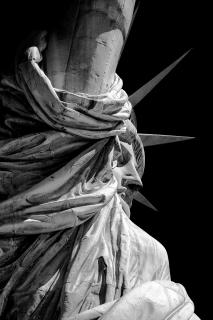Come, come, whoever you are: you are welcome here

I want to say to all those who would close the door, who would be guided by fear instead of hope, who would clutch in scarcity rather than live in generosity, who would say “No, you can’t come here”—
I want to say: How dare you.
For the Lord your God is God of gods and Lord of lords, . . mighty and awesome, who is not partial and takes no bribe, who executes justice for the orphan and the widow, and who loves the strangers, providing them with food and clothing. You shall also love the stranger, for you were strangers once too.*
How dare you?
Listen to the voices.
See the faces.
Open your heart.
Lest the tears of the holy drown us all, may we be summoned to a higher calling, one of faithfulness and hospitality and open-hearted love; the best of us and not the worst.
Both impulses are in our history and in our present.
That colonizing and the nativist, the supremacist—that’s part of our history. The part that says difference is scary and there isn’t enough and so it’s just for us—that is part of who we are, we who live here in this land.
But it’s only part of our history, and only part of our mythos, our story, about ourselves.
Another part of our story is the welcome—
the table, open;
the door, open;
the heart, open;
the embrace of variety and diversity as quintessentially American, the land of freedom regardless of origin or color or faith, the affirmation that there’s plenty. There’s enough. Come, and be welcome.
That’s another part of our story.
When you give thanks this week, give thanks for the best of our story.
Give thanks for those who have made journeys: journeys of time and space and journeys of the heart—including yourself. Give thanks that there is plenty, give thanks for hope and love and possibility. Give thanks for love, which—despite what you might see on the news — is stronger, in the end, than hate. Give thanks, and from that place of gratitude. Open your heart, open your door; be a living witness of the spirit of hospitality.
In joyful thanksgiving, whose bounty we share, come and go with me; take one more step; when bound to human care and hope, then we are free.
In awareness of the truth of our own stories, our own contingency and fragility, our own need to be welcomed, we can see in the faces of one another, we can hear in the voices of one another, the core humanity—our siblings, our family, our neighbor—and say, come, come, whoever you are, you are welcome here.
It is my prayer this morning that we heed the words etched on that statue: that we have a country where those words apply to everyone, not just some, where our hearts are open and our door stands ajar.
As the poet wrote:**
Not like the brazen giant of Greek fame,
With conquering limbs astride from land to land;
Here at our sea-washed, sunset gates shall stand
A mighty woman with a torch, whose flame
Is the imprisoned lightning, and her name
Mother of Exiles. From her beacon-hand
Glows world-wide welcome; her mild eyes command
The air-bridged harbor that twin cities frame.
“Keep ancient lands, your storied pomp!” cries she
With silent lips. “Give me your tired, your poor,
Your huddled masses yearning to breathe free,
The wretched refuse of your teeming shore.
Send these, the homeless, tempest-tost to me,
I lift my lamp beside the golden door!”
May it be, and may we make it so.
*Deuteronomy 10:18-19
**”The New Colossus” by Emma Lazarus
| Date added | |
|---|---|
| Tagged as |